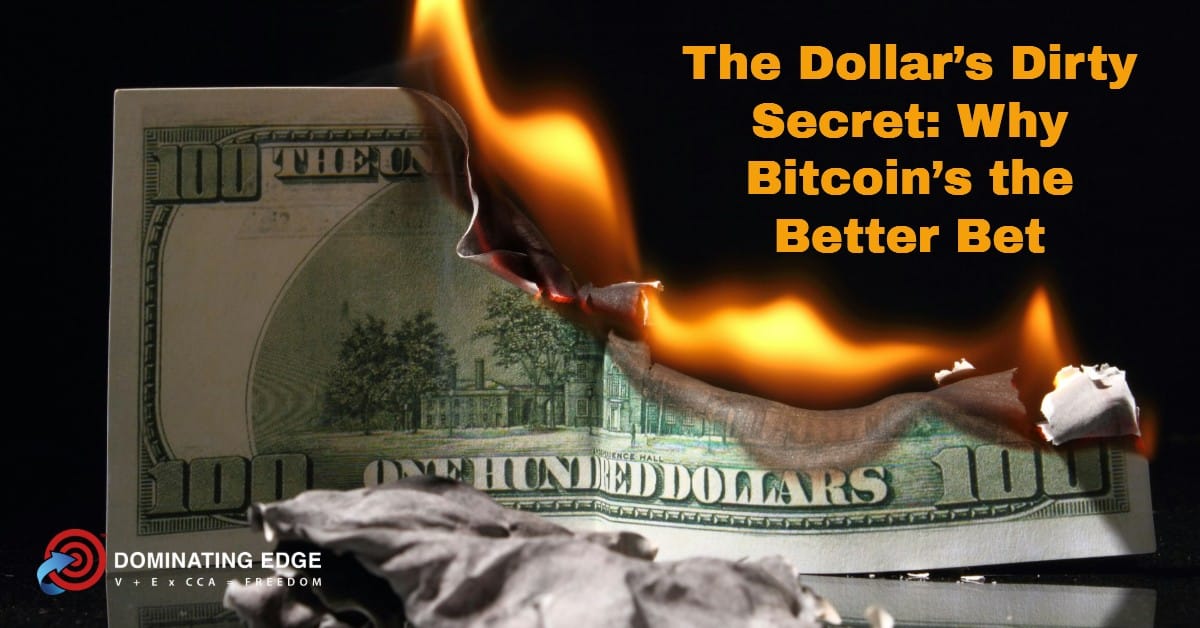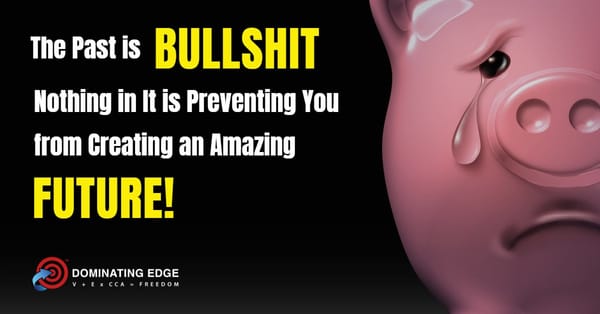The Dollar’s Dirty Secret: Why Bitcoin’s the Better Bet
There’s a lot of chatter out there about Bitcoin being a scam, but let’s take a closer look. What if the real issue isn’t Bitcoin, but the dollar?

There’s a lot of chatter out there about Bitcoin being a scam, but let’s take a closer look. What if the real issue isn’t Bitcoin, but the dollar? That might sound crazy, but stick with me. Once you dig deeper, you’ll see why Bitcoin could be the better option and why the dollar isn’t as solid as you might think.
Why the Dollar Isn’t What It Seems
Did you know that the U.S. dollar used to be backed by gold? This meant you could trade dollars for real gold at any time. But in 1971, that connection was cut, and now the dollar isn’t backed by anything except trust. That’s right- the only reason the dollar has value is because we all agree it does. It’s like agreeing that Monopoly money is worth something in a game.
Without that belief, the dollar is just a piece of paper or numbers in a bank account.
It gets worse. Since COVID-19, over 40% of the dollars in circulation were printed. Think about that for a second. The government created trillions of dollars out of thin air, and that increased the supply of dollars dramatically.
What happens when there’s too much of something? It loses value. That’s why we’ve been seeing higher prices for food, gas, and housing - it’s called inflation.
Bitcoin: The Limited Digital Gold
Now let’s talk about Bitcoin. Unlike the dollar, Bitcoin has a limited supply. There will only ever be 21 million Bitcoins (and many of those have been lost over the years) no more, no less. No one can create extra Bitcoins, not even the most powerful government or bank.
That’s what makes Bitcoin different. It’s designed to be scarce, just like gold or diamonds.
Because Bitcoin’s supply is fixed, it can’t be inflated like the dollar. This makes it a store of value. Over time, people are starting to see Bitcoin as “digital gold” because it holds its value and isn’t controlled by any one person, company, or country.
Currency Has Always Been About Trust
Throughout history, humans have used all kinds of things as money - gold, silver, beads, even sea shells. That’s right, at one point, people used shells to buy and sell goods. The reason these things worked as money wasn’t because they were magical; it’s because people trusted them.
The same thing is true for the dollar and Bitcoin. The dollar works because we believe it does, but that belief can change - especially when people see how easily the government prints more and more of it and it buys less and less. Bitcoin, on the other hand, is based on trust in its technology. It runs on a secure, decentralized network called blockchain, and no one can tamper with it.
Why Bitcoin Matters
Bitcoin isn’t just about getting rich or investing - it’s about having money that can’t be manipulated. Governments can print more dollars whenever they want, but they can’t do that with Bitcoin. For people looking for an alternative to inflation and financial instability, Bitcoin offers a solution.
And here’s the best part: Bitcoin doesn’t care who you are, where you’re from, or what your financial status is. It’s accessible to anyone with an internet connection.
Bitcoin Is Not a Scam – The Dollar Is!
There’s a lot of chatter out there about Bitcoin being a scam, but let’s take a closer look. What if the real issue isn’t Bitcoin, but the dollar? That might sound crazy, but stick with me. Once you dig deeper, you’ll see why Bitcoin could be the better option and why the dollar isn’t as solid as you might think.
Why the Dollar Isn’t What It Seems
Did you know that the U.S. dollar used to be backed by gold? This meant you could trade dollars for real gold at any time. But in 1971, that connection was cut, and now the dollar isn’t backed by anything except trust. That’s right—the only reason the dollar has value is because we all agree it does. It’s like agreeing that Monopoly money is worth something in a game. Without that belief, the dollar is just a piece of paper or numbers in a bank account.
It gets worse. Since COVID-19, over 40% of the dollars in circulation were printed. Think about that for a second. The government created trillions of dollars out of thin air, and that increased the supply of dollars dramatically. What happens when there’s too much of something? It loses value. That’s why we’ve been seeing higher prices for food, gas, and housing—it’s called inflation.
Bitcoin: The Limited Digital Gold
Now let’s talk about Bitcoin. Unlike the dollar, Bitcoin has a limited supply. There will only ever be 21 million Bitcoins—no more, no less. No one can create extra Bitcoins, not even the most powerful government or bank. That’s what makes Bitcoin different. It’s designed to be scarce, just like gold or diamonds.
Because Bitcoin’s supply is fixed, it can’t be inflated like the dollar. This makes it a store of value. Over time, people are starting to see Bitcoin as “digital gold” because it holds its value and isn’t controlled by any one person, company, or country.
Currency Has Always Been About Trust
Throughout history, humans have used all kinds of things as money—gold, silver, beads, even sea shells. That’s right, at one point, people used shells to buy and sell goods. The reason these things worked as money wasn’t because they were magical; it’s because people trusted them.
The same thing is true for the dollar and Bitcoin. The dollar works because we believe it does, but that belief can change—especially when people see how easily the government prints more and more of it. Bitcoin, on the other hand, is based on trust in its technology. It runs on a secure, decentralized network called blockchain, and no one can tamper with it.
Bitcoin Goes Mainstream
If Bitcoin were truly a scam, why are the largest financial institutions in the world embracing it? Companies like BlackRock, Charles Schwab, Fidelity, and Vanguard are now offering Bitcoin ETFs (Exchange-Traded Funds) to their customers, making it easier than ever for everyday investors to gain exposure to Bitcoin.
These financial giants wouldn’t risk their reputation on something that isn’t legitimate. Their involvement signals that Bitcoin is no longer just a niche interest - it’s a recognized, valuable asset being integrated into the traditional financial system.
The Bottom Line
The next time someone calls Bitcoin a scam, think about this: the dollar isn’t backed by anything, its value is shrinking, and its supply can be increased whenever the government wants.
Bitcoin, on the other hand, has a fixed supply, operates on trustless technology, and gives people a way to protect their money from inflation.
So, is Bitcoin the real scam? Or is the dollar the one pulling the wool over our eyes? You decide.
Jeff Hammer, Bitcoin Enthusiast and Advocate for Financial Freedom
#BitcoinVsDollar #BitcoinExplained #IsBitcoinAScam #DigitalGold #BitcoinEducation #Cryptocurrency #FinancialFreedom #Inflation #Blockchain #BitcoinETF




